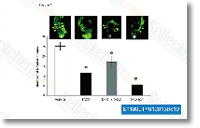Along exactly the same notion, the sup pressive result grew to become diminished in the really malignant cell line MIII and therefore indicating that Akt mediated inhibitory results are likely to be blocked when cells have undergone innovative transformation. It can be attainable that added oncogenic pathways embedded in MIII might have cross talked with and therefore liberated the inhibitory effects provoked by Akt signaling. The notion that advanced neoplastic functions can fight the inhibitory impact exerted from Akt activation was substantiated by evaluating the influence of Akt on key tenance of stem progenitor cell populations in the isogenic cell line process. In spite of the truth that the intrinsic stem professional genitor subpopulations vary amongst MI, MII and MIII, overexpression of any of the three Akt isoforms concordantly repressed the frequency of ALDH cells with imply inhibition prices currently being 40% in MI and 50% in MII, but rather negligible in MIII.
As MIII harbors a just about undetectable ALDH subpopulation, the necessity of assessing the CD44 CD24 very low phenotype became apparent. Interestingly, we observed that the fraction of inhibitor Rapamycin CD44 CD24 very low cells is proportional for the malignant state, Al though MLN0128 the inhibitory impact of Akt on MI was undetect able because of its really lower basal degree, MII was influenced to a remarkable degree, In sharp contrast, this inhibitory effect was com pletely blocked in MIII cells, Moreover, this rescuing effect is in close agreement with information created through the transwell migration assay, With each other, they depict a novel paradigm that Akt mediated inhibition of EMT transcripts, cell motility, and stem progenitor cell growth, is possibly inversely linked with the malignant status of breast epithelia.
Most significantly, this thought is usually recapitulated in superior breast cancer cell lines by which Myr Akt expression rendered un detectable inhibitory effects on sustaining the ALDH subpopulation, Activated  Akt signaling conveys resistance to cell death induced by chemotherapeutic medicines The findings presented above demonstrate that activated Akt renders both inhibitory or marginal, but by no means enhan cing, effects on EMT transcripts, cell motility and in maintenance of stem progenitor cell populations. These observations are paradoxical because they are opposite to your basic oncogenic effects generally linked with Akt.
Akt signaling conveys resistance to cell death induced by chemotherapeutic medicines The findings presented above demonstrate that activated Akt renders both inhibitory or marginal, but by no means enhan cing, effects on EMT transcripts, cell motility and in maintenance of stem progenitor cell populations. These observations are paradoxical because they are opposite to your basic oncogenic effects generally linked with Akt.
DNA metabolism
Siteman Cancer Center's DNA Metabolism and Repair Program includes 23 investigators
